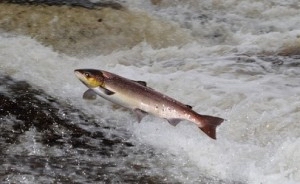 oration has signed on to a pledge to not sell genetically engineered salmon in its department stores nationwide, joining nearly 60 other grocery chains such as Trader Joe’s, Whole Foods and Aldi, as part of the Campaign for GE-Free Seafood led by environmental organization Friends of the Earth.
oration has signed on to a pledge to not sell genetically engineered salmon in its department stores nationwide, joining nearly 60 other grocery chains such as Trader Joe’s, Whole Foods and Aldi, as part of the Campaign for GE-Free Seafood led by environmental organization Friends of the Earth.Three other regional retailers threw in their pledges on Wednesday as well. H-E-B, Giant Eagle and Meijer each added their locations to the total of 4,662 grocery stores in the U.S. that will not carry GE salmon, should the U.S. Food and Drug Administration approve it.
The FDA is expected to deliver its final decision on GE salmon approval soon. The public comment period on the FDA’s draft environmental assessment and finding of no significant impact expired on April 26, after tallying up more than 1.8 million comments.
GE salmon has been under consideration by the FDA since 1996, when AquaBounty, creator of the AquAdvantage salmon, first applied for approval. If approved, the Massachusetts-based company plans to breed its GE fish in Canada’s Prince Edward Island and raise them in farms in Panama for sale in the U.S.
The salmon is a modified Atlantic salmon that takes a growth-promoting gene from Chinook salmon and a gene from the eel-like ocean pout that allows it to grow year-round. The result is a salmon that grows to full size in 18 months instead of 3 years.
Groups opposed to GE salmon say that if the fish escaped into natural ecosystems it could spread its genes and out-compete natural salmon. AquaBounty contends there is virtually no chance of that happening, as all the fish are bred to be sterile and all female, along with being raised in landlocked tanks that don’t touch natural waters. All fish will also be slaughtered and processed in Panama before being shipped to the U.S.
The announcement that Target and other retailers would reject GE salmon coincided with the publication of a study in the journal Proceedings of the Royal Society that found hybrids between AquAdvantage salmon and wild brown trout acquired the ability to grow faster than hybrids between trout and non-GE salmon. The study, which is the first of its kind, also found that those GE hybrids out-competed the wild varieties for food.
In a response to the study, AquaBounty said that while the authors acknowledge the GE hybrids would be “improbable in nature,” the study failed to mention that the hybrids would be sterile.
In the FDA’s draft environmental assessment on GE salmon, published in May 2012, the agency said did not expect AquAdvantage to impact wild salmon stock if the company properly followed its proposed procedures. The agency has also concluded the salmon would be as safe to eat and nutritionally equivalent to non-GE Atlantic salmon.
The pledge for GE-free seafood campaign, led by Friends of the Earth, is supported by more than 30 consumer and environmental groups. The campaign asks grocery stores, restaurants, chefs and seafood companies to pledge to not knowingly purchase or sell GE seafood.
“Since these fish will likely not be labeled, consumers have to rely on retailers like these to reject unwanted and unnecessary GE fish,” said Heather Whitehead, online campaigns director for the Center for Food Safety in an press statement. “We will continue to pressure other retailers to side with consumers.”





